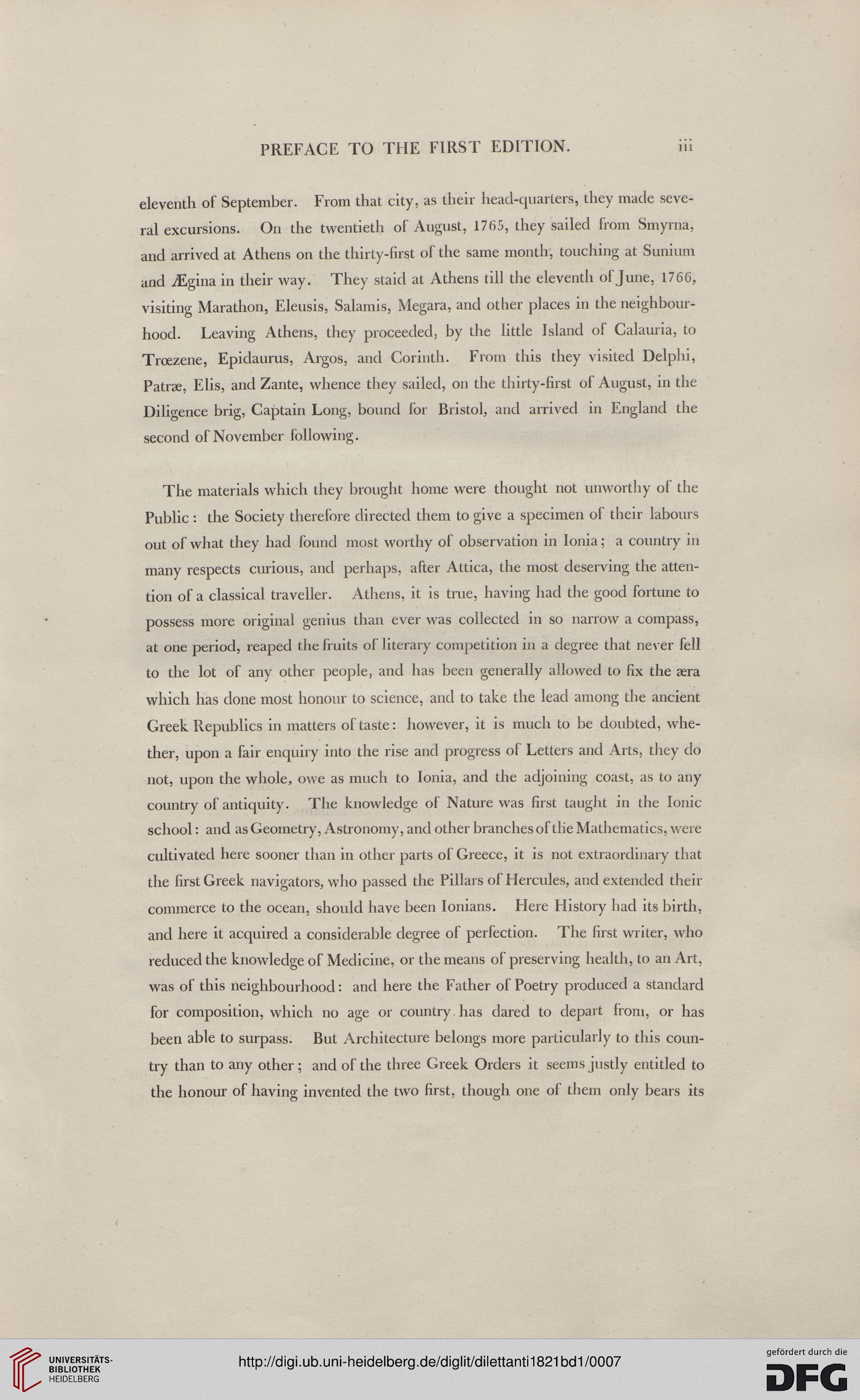PREFACE TO THE FIRST EDITION. iii
eleventh of September. From that city, as their head-quarters, they made seve-
ral excursions. On the twentieth of August, 1765, they sailed from Smyrna,
and arrived at Athens on the thirty-first of the same month, touching at Sunium
and iEgina in their way. They staid at Athens till the eleventh of June, 1766,
visiting Marathon, Eleusis, Salamis, Megara, and other places in the neighbour-
hood. Leaving Athens, they proceeded, by the little Island of Calauria, to
Trcezene, Epidaurus, Argos, and Corinth. From this they visited Delphi,
Patrae, Elis, and Zante, whence they sailed, on the thirty-first of August, in the
Diligence brig, Captain Long, bound for Bristol, and arrived in England the
second of November following.
The materials which they brought home were thought not unworthy of the
Public : the Society therefore directed them to give a specimen of their labours
out of what they had found most worthy of observation in Ionia; a country in
many respects curious, and perhaps, after Attica, the most deserving the atten-
tion of a classical traveller. Athens, it is true, having had the good fortune to
possess more original genius than ever was collected in so narrow a compass,
at one period, reaped the fruits of literary competition in a degree that never fell
to the lot of any other people, and has been generally allowed to fix the sera
which has done most honour to science, and to take the lead among the ancient
Greek Republics in matters of taste: however, it is much to be doubted, whe-
ther, upon a fair enquiry into the rise and progress of Letters and Arts, they do
not, upon the whole, owe as much to Ionia, and the adjoining coast, as to any
country of antiquity. The knowledge of Nature was first taught in the Ionic
school: and as Geometry, Astronomy, and other branches of tlie Mathematics, were
cultivated here sooner than in other parts of Greece, it is not extraordinary that
the first Greek navigators, who passed the Pillars of Hercules, and extended their
commerce to the ocean, should have been Ionians. Here History had its birth,
and here it acquired a considerable degree of perfection. The first writer, who
reduced the knowledge of Medicine, or the means of preserving health, to an Art,
was of this neighbourhood: and here the Father of Poetry produced a standard
for composition, which no age or country, has dared to depart from, or has
been able to surpass. But Architecture belongs more particularly to this coun-
try than to any other; and of the three Greek Orders it seems justly entitled to
the honour of having invented the two first, though one of them only bears its
eleventh of September. From that city, as their head-quarters, they made seve-
ral excursions. On the twentieth of August, 1765, they sailed from Smyrna,
and arrived at Athens on the thirty-first of the same month, touching at Sunium
and iEgina in their way. They staid at Athens till the eleventh of June, 1766,
visiting Marathon, Eleusis, Salamis, Megara, and other places in the neighbour-
hood. Leaving Athens, they proceeded, by the little Island of Calauria, to
Trcezene, Epidaurus, Argos, and Corinth. From this they visited Delphi,
Patrae, Elis, and Zante, whence they sailed, on the thirty-first of August, in the
Diligence brig, Captain Long, bound for Bristol, and arrived in England the
second of November following.
The materials which they brought home were thought not unworthy of the
Public : the Society therefore directed them to give a specimen of their labours
out of what they had found most worthy of observation in Ionia; a country in
many respects curious, and perhaps, after Attica, the most deserving the atten-
tion of a classical traveller. Athens, it is true, having had the good fortune to
possess more original genius than ever was collected in so narrow a compass,
at one period, reaped the fruits of literary competition in a degree that never fell
to the lot of any other people, and has been generally allowed to fix the sera
which has done most honour to science, and to take the lead among the ancient
Greek Republics in matters of taste: however, it is much to be doubted, whe-
ther, upon a fair enquiry into the rise and progress of Letters and Arts, they do
not, upon the whole, owe as much to Ionia, and the adjoining coast, as to any
country of antiquity. The knowledge of Nature was first taught in the Ionic
school: and as Geometry, Astronomy, and other branches of tlie Mathematics, were
cultivated here sooner than in other parts of Greece, it is not extraordinary that
the first Greek navigators, who passed the Pillars of Hercules, and extended their
commerce to the ocean, should have been Ionians. Here History had its birth,
and here it acquired a considerable degree of perfection. The first writer, who
reduced the knowledge of Medicine, or the means of preserving health, to an Art,
was of this neighbourhood: and here the Father of Poetry produced a standard
for composition, which no age or country, has dared to depart from, or has
been able to surpass. But Architecture belongs more particularly to this coun-
try than to any other; and of the three Greek Orders it seems justly entitled to
the honour of having invented the two first, though one of them only bears its




